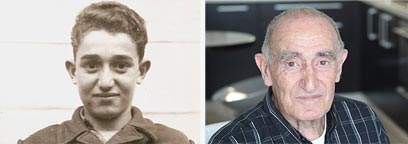
Holocaust orphan finds new relatives
Martin Hecht lost most of his family in Auschwitz. Since Ynet published his story, his phone hasn't stopped ringing. Fourth article in 'Remember Me' series
"People have been calling from New Zealand, the United States, Canada, England and Croatia. They all read Martin's life story and were moved by it," says Aida Hecht, Martin's wife. "We never imagined such a response."
Hecht, who was born in Transylvania, was sent in 1944 to the Auschwitz-Birkenau death camp, where he lost most of his family members. He and his brother Jack survived the horror, while his parents and other siblings were murdered.
- For further information and the full list of displaced children, visit the "Remember Me?" website at http://rememberme.ushmm.org/
Hecht told Ynet about the time he spent in Auschwitz: "We were sent to a hut. One of the camp's veteran prisoners, who saw the shock on my face, asked: 'Do you know where you are?' I said no. 'You're in Auschwitz, there's no way back from here. Everyone dies here in the end.'
"I couldn't understand what he was talking about. 'Your family has already been burned a long time ago,' he said. 'Look outside, do you see the chimney? This is where Jews are burned.' And I, a 12-year-old boy, didn't understand anything. Who's burning? Who's being burned? Why would they want to kill us?"

Vague childhood memories. Martin Hecht (Photo: Eli Elgarat, United States Holocaust Memorial Museum)
The many phone calls included one which was particularly moving: A distant relative, who lives in Tel Aviv, revealed to Martin that he has additional relatives he didn't know about.
"When we discussed the roots of his family, we raised names of people Martin had never heard of, perhaps because his childhood memories are vague," says Aida.
"One of the relatives, it turns out, lives in the US and claims that her grandfather was the brother of Martin's grandfather. She is 90 and we plan to visit her and get to know her."
What happened to brother Jack?
In addition to the family ties, Martin was also approached by relatives of Shoah victims who were sent to the many camps he was held in during the Holocaust. Martin knows some of them, others died and their relatives want to learn more of their life and death.
"One of them, whose relatives died in the Flossenbürg concentration camp, turned to the Holocaust Museum in Washington and discovered the place and date of their death in the museum's records."
But the most exciting thing, says Martin, were the many phone calls he received from distant relatives, especially the young generation, which heard about the hardship he went through during the Holocaust for the first time.
"Martin was always very introvert and never spoke about what happened to him. The distant family knew he was in Auschwitz, but nothing more. And suddenly they read the entire story for the first time and were very excited. They couldn't imagine just how much he had suffered there," says his wife.
Many of those who contacted Martin inquired about his brother Jack.
"After several years in the Jewish community hostel, he studied in the ORT school and settled in London. He married a Christian woman who converted to Judaism and he has two children, one of whom lives in Jerusalem," says Martin. Jack still lives in London.










